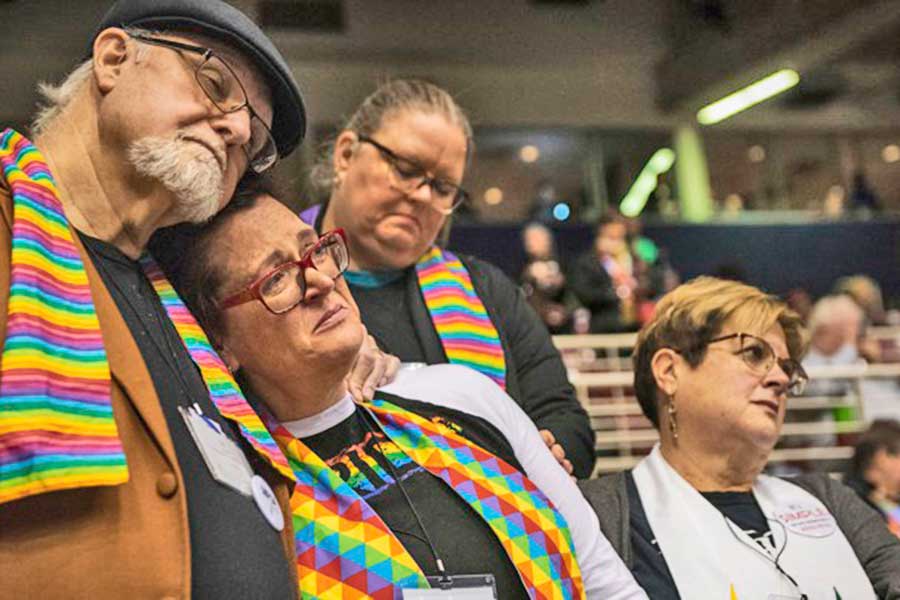Before Methodists gathered in St. Louis last month to debate the future of LGBT people in the second-largest denomination of protestant Christians in America, it was the conservatives who were talking about leaving. Now it is the progressive wing of the United Methodist Church that is considering its options.
The denomination voted Feb. 26 at a conference in St. Louis to reinforce its prohibitions against same-sex unions and the hiring of openly gay clergy. As a result, it is widely expected that some churches will leave the denomination.
“Some will want to disaffiliate from the UMC sooner rather than later,” said Ophelia Hu Kinney, spokesperson at the Reconciling Ministries Network, a national organization of pro-LGBT churches. It has 973 affiliates representing more than 35,000 people.
So great is the anticipation of defections that a law firm in Detroit is advertising on its web page that it can help churches break free from the denomination.
“Lead your congregation to a New Beginning,” says the Dalton Tomich law firm. It offers a free guide to leaving the United Methodist Church. Leaving, the web page says, is a “complex but navigable process.”
In the months leading up to the special General Conference, the Wesleyan Covenant Association, which is based in Reynoldsburg, Ohio, and which describes itself as an organization of “spirit-filled orthodox churches,” announced contingency plans for leaving the denomination.
Now that the convention has ended with a win for traditionalists, the organization says it will “work for renewal and revitalization in the church.”
Most religious groups have over time experienced splits over theology and social issues like slavery. One early break from the Methodist Church came in Philadelphia in 1794 when Richard Allen and Absalom Jones led African-American members out of St. George’s Methodist church when white leaders tried to segregate the congregation. That break led to the formation of the African Methodist Episcopal church.
Church schisms were more common when more people identified as churchgoers, said Rebecca Alpert, professor of religion at Temple University.
“When religions were more robust the people (leading the revolt) could assume people would follow them,” said Alpert, a lesbian who was one of the first women ordained as a rabbi.
The decision over breaking away is complicated, having to do with how strongly one identifies as a Methodist. Some Christians night be content identifying with another similar denomination.
“It’s not just a game in which you can take your bat and ball and go home,” Alpert said.
The Reconciling Ministries Network is advising its affiliates to take some time to think about what comes next, said spokesperson Kinney.
“We have hopes that the institution can be reformed.”
The Chestnut Hill United Methodist Church came up with a creative solution to its concerns about the direction of the UMC in 2009 when it added an affiliation to the United Church of Christ and changed its name to Chestnut Hill United Church. But the latest developments will require some further thinking, said senior pastor Linda Noonan.
One option is to affiliate with a part of the denomination that is openly resisting the anti-gay elements. The Western Jurisdiction, which includes six western states, is defying the changes called for in St. Louis and inviting churches elsewhere to join it.
The decision of her 140 church members will be to take some form of action, Noonan said.
“I have confidence that they will not do nothing.”
Rev. John Pritchard, pastor of Calvary United Methodist Church in West Philadelphia, said he was waiting to see what will happen when a Judicial Council reviews the actions of the conference. In the meantime, he and his parishioners will be thinking about whether they will be leave the UMC or look for ways to survive within it.
But he asks, “How do you survive that? I have no idea.”
Rev. Lydia E. Muñoz, lead pastor at the Church of the Open Door in Kennett Square, said she and her congregation are going to treat LBGT worshipers with full equality no matter what.
“The bottom line is: they can come for me,” she said about traditionalists who might complain. “I want to see people who have that much malice and un-Christian-like spirit come for me. I want them to do that in front of our whole congregation.”
Muñoz is married to Jim McIntire, the minister of Royersford United Methodist Church in Montgomery County. He made a commitment with other clergy in the mid 1990s to do same-sex marriages.
“I will stick with that commitment,” he said.
Michael Gilbertson plans to remain a Methodist. Gilbertson, who turned 70 this week, left the denomination several years ago after a previous failure of the church to fully accept gays and lesbians. But when Arch Street United Methodist Church minister Robin Hynicka and 35 other Methodist leaders conducted a same-sex wedding at Arch Street in 2013, he decided he would come back to the fold.
The clergy at the wedding faced a complaint filed by 50 area ministers, but the complaint was later dropped when the clergy at the wedding acknowledged that they had broken the rules.
Although he feels that the UMC “has stabbed me in the back,” Gilbertson is not moving.
“I left once and came back,” he said. “I’m not going to leave again. They aren’t going to kick me out. There’s work to be done to show them that the Kingdom of God includes all of God’s children.”
